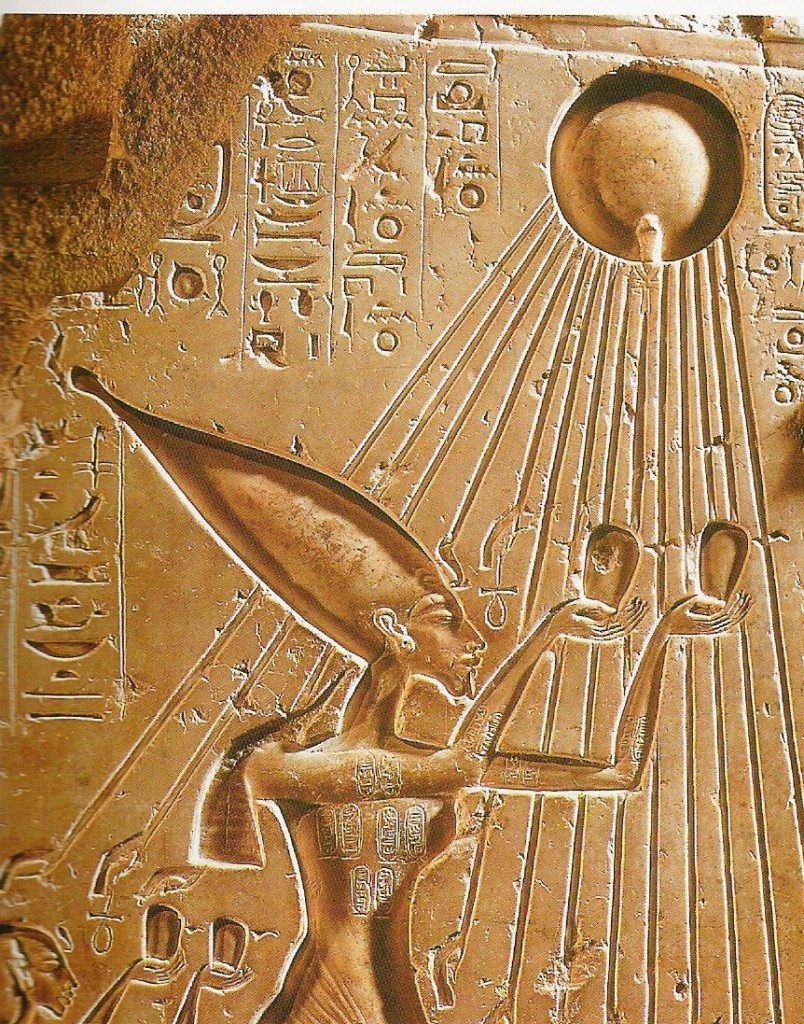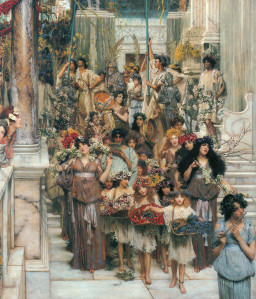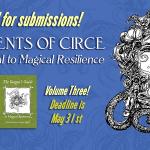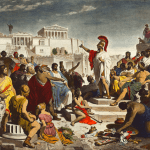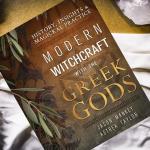I led my family in a Mid-Summer ritual this past Saturday. It went off well, except for a brief rainstorm that delayed the culminating fire sacrifice, and a little bit of irreverence from my youngest during the reverent part of the event.
The Prelude was the chant “Force of Nature” by Thorn Coyle and Sharon Knight:
Hail to the summer sky,
blazing fierce immortal eye.
Hail to the fire, burning in the earth.
Hail to the wind that blows
alive beneath the wings of crows.
Blessed be the mighty force of nature.
Hail to the water fall,
feeds the spring that keeps us all.
Hail to the standing stones that fill our hearts with awe.
Hail to the stars above.
Hail to the strength of love.
Blessed be the mighty force of nature.
I then introduced the ritual as follows:
“Today we celebrate Mid-Summer, the hottest time of the year. The day is called Lughnasadh by many Pagans — named after an ancient Irish festival. Most Pagans celebrate this as the first of the harvest festivals. But here in Indiana, it’s not harvest time. It’s still the middle of summer, the hottest time of the year. So we’ll be celebrating Mid-Summer today.
“This is the time we celebrate the love of the God and the Goddess. The heat of the sun is the reflection of the passion of the God and Goddess. This is the day when the heat of their passion grows so hot that the God is actually consumed by its flames. Since this is the middle of summer this is also the beginning of the end of summer. This is the moment when the flower of summer is blossoming at its fullest, and tomorrow it will begin to wilt. Mid-Summer is like fruit when has ripened to the point where it is its juiciest and tastiest, but on the next day it will begin to rot. The meaning of this day is that pleasure is fleeting. We must enjoy life while we can, knowing that it cannot last forever. When we see the beautiful flower blossom, we must either leave it, knowing we may never see it again, or pick it, knowing that in doing so we also kill it.
“This day is about love and death. First we’re going to talk about love.”
I then serenaded my wife with “Sunshine of Your Love” by Cream:
It’s getting near dawn
When lights close their tired eyes
I’ll soon be with you my love
To give you my dawn surprise
I’ll be with you, darling, soon
I’ll be with you when the stars start falling
I’ve been waiting so long
To be where I’m going
In the sunshine of your love
I’m with you, my love
The light’s shining through on you
Yes, I’m with you, my love
It’s the morning and just we two
I’ll stay with you, darling, now
I’ll stay with you ’til my seas are dried up
I’ve been waiting so long
To be where I’m going
In the sunshine of your love
I’m with you, my love
The light’s shining through on you
Yes, I’m with you, my love
It’s the morning and just we two
I’ll stay with you, darling, now
I’ll stay with you ’til my seas are dried up
I’ve been waiting so long
I’ve been waiting so long
I’ve been waiting so long
To be where I’m going
In the sunshine of your love.
My wife and I then recited a redacted (for the kid’s benefit) selection from the Song of Solomon, which I introduced as follows:
“The Song of Songs or the Song of Solomon is a book in the Bible. It is a love poem. Is that strange that there is a love poem in the Bible. Some people believe that it was originally a poem about love between the God and the Goddess that was recited by a priest and priestess on a holy day like this. I have edited the poem a little to make it easier for you to understand, and also to take out some of the parts that you might find embarrassing because they are about grown up love.”
Female part:
Let him kiss me with the kisses of his mouth: for thy love is better than wine. A bundle of fragrance is my beloved unto me; he shall lie all night with me. Our bed is green; the beams of our house are cedar trees and the rafters are fir trees.
As the apple tree among the trees of the wood, so is my beloved among the sons of men. I sat down under his shadow with great delight, and his fruit was sweet to my taste. His left hand is under my head, and his right hand doth embrace me. Rise up, my love, my fair one, and come away. For, lo, the winter is past, the rain is over and gone; the flowers appear on the earth; the time of the singing of birds is come. The fig tree putteth forth her green figs, and the vines with the tender grape give a good smell. Arise, my love, my fair one, and come away. O my dove, let me see thy countenance, let me hear thy voice; for sweet is thy voice, and thy countenance is comely. My beloved is mine, and I am his.
Male part:
Behold, thou art fair, my love; behold, thou art fair; thou hast doves’ eyes within thy locks. Thy lips are like a thread of scarlet, and thy speech is comely. We are like two deer which feed among the lilies. Thou art all fair, my love. Thou hast ravished my heart; thou hast ravished my heart with thine eyes. How fair is thy love, how much better is thy love than wine! and thine fragrance than all spices! Thy lips, O my spouse, drop as the honeycomb: honey and milk are under thy tongue.
How beautiful are thy feet, O prince’s daughter! the joints of thy thighs are like jewels, the work of the hands of a cunning workman. Thy navel is like a round goblet, which wanteth not liquor. Thy neck is as a tower of ivory; thine eyes like fishpools. How fair and how pleasant art thou, O love, for delights! This thy stature is like to a palm tree and clusters of grapes. The smell of thy nose like apples; and the roof of thy mouth like the best wine for my beloved, that goeth down sweetly, causing the lips of those that are asleep to speak.
Female part:
I am my beloved’s, and his desire is toward me. Come, my beloved, let us go forth into the field; let us get up early to the vineyards; let us see if the vine flourish, whether the tender grape appear, and the pomegranates bud forth: there will I give thee my love.
The kids then read the following about the meaning of Midsummer:
Mid-Summer is the hottest time of the year. This time of the year reminds us that nothing lasts forever. We do not live in an unchanging world, but in the living, dying, growing, and fading realm of the earth. Whenever something is completed, we must let it go. Because the things we love don’t last forever, we love them all the more while they are here. But letting go of things and people we love is never easy. Midsummer is a time to practice letting go of what is completed and done — whether it is an old toy, a flower, or a part of ourselves.
Letting go of something doesn’t mean just getting rid of it. When we let go, we allow it to become something different. A child who lets go of an old toy lets that toy be transformed into a new toy for another child. A mother or father who let’s go of a child that’s grown up lets that child become a man or woman. We can be both sad for the loss, and happy for the transformation that has taken place. These times are sacred to the Goddess and the God.
People all over the world burn fires at Midsummer. Pagans sometimes build what is called a Wicker Man. They put together sticks and wood to make it look like a person and decorate it with flowers and green leaves. Then they burn it to represent the sadness of loss and the joy of transformation.
As we are always changing, so are the Goddess and the God. All through the year, since he was born at the winter solstice, the God, the Oak King, has been growing, until he reached his strongest point at the summer solstice. But everything and everyone that fulfills its purpose must change.
The Oak King embraces the Summer Queen in love, the love that moves the world. It is a love that is so complete that all dissolves into ecstasy and death. The God dies in this world in order to be born again at the winter solstice, and to make room for his twin brother, the Holly King, who will begin to grow stronger and stronger. At the same time, the Goddess begins her transformation from the Summer Queen to the Queen of the Harvest.
The fire which we light today symbolizes the beginning of the death of the Oak King. While our fire will go out today, the fire of Summer will go out more slowly. Summer will not end and the Oak King will not die until the fall equinox, six and half weeks from now, at the end of September. At the fall equinox the Oak King will begin his journey to the Underworld where he will ultimately find rebirth.
As the Wheel of the Year turns, so we must accept change in our own lives.
I wanted to keep the kids engaged and my wife is not a lover of poetry, so I skipped the poem “I sought the wood in summer” by Willa Cather, but I include it here because I think it is wonderful:
I sought the wood in summer
When every twig was green;
The rudest boughs were tender
And buds were pink between.
Light-fingered aspens trembled
In fitful sun and shade,
And daffodils were golden
In every starry glade.
The brook sang like a robin—
My hand could check him where
The lissome maiden willows
Shook out their yellow hair.
“How frail a thing is Beauty,”
I said, “when every breath
She gives the vagrant summer
But swifter woos her death.
For his the star dust troubles,
For this have ages rolled;
To deck the wood for bridal
And slay her with the cold.”
I sought the wood in winter
When every leaf was dead;
Behind the wind-whipped branches
The winter sun set red.
The coldest star was rising
To greet that bitter air,
The oaks were writhen giants;
Nor bud nor bloom was there.
The birches, white and slender,
In deathless marble stood,
The brook, a white immortal,
Slept silent in the wood.
“How sure a thing is Beauty,”
I cried. “No bolt can slay,
No wave nor shock despoil her,
No ravishers dismay.
Her warriors are the angels
That cherish from afar,
Her warders people Heaven
And watch from every star.
The granite hills are slighter,
The sea more like to fail;
Behind the rose the planet,
The Law behind the veil.”
We then had our activity where we feasted on ripe fruit — pears, nectarines, plums, which were wonderfully juicy, and we decorated grapevine wreaths with cut flowers to be offered to the fire. As we decorated our offerings, I instructed the kids to think about things that they enjoy about summertime.
We then gathered around the fire and I offered the following words:
How hard a mistress is Nature,
When with every breath
She births the vagrant summer
But swifter woos his death.
I then had each person recite the following words (from Virginia Woolf) before putting their wreath in the fire:
To look life in the face
And to know it for what it is
To love it for what it is
And then to put it away
After a moment of silence, we concluded the ritual.






